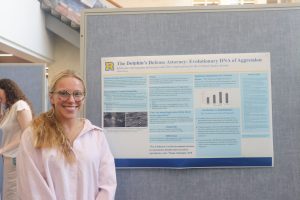
These past couple of weeks have been very telling about the Rollins College community. At the beginning of last week, one of Rollins’ students accused the school of suspending him for challenging a Muslim professor with his Christian beliefs. He took this story to one of Central Florida’s least-known, right-wing blogs—the Central Florida Post—where Jacob Engels covered the story.
This student claimed that he challenged his professor’s tolerance of a fellow student’s radical Islamic hate speech, which allegedly persecuted homosexuals. From there, it was said that this professor reported the student for being disruptive and sending threatening e-mails after receiving a failing grade on an essay.
Part of his suspension stated that the student must refrain from going to class and communicating with or coming close to the professor. Yet, soon after, the student was accused of showing up to the class after being suspended; he claimed that he was having dinner at the time of the class.
This student’s claim of being unjustly suspended by the school for a difference of opinion is not only unfounded, conflicted by the student’s own behavior; it also completely contradicts Rollins College’s mission statement. Consequently, the majority of campus has been wary and quick to question the validity of the blog post in question.
Central Florida Post seemed like a questionable media source to many, but Engels included a copy of the student’s suspension notice, along with a picture of the student at dinner at the time he was accused of being in the classroom after his suspension, so it seemed as if there was some truth behind the post. According to rumors, some students believed that the professor was just inexperienced and unsure of how to handle disruptive students, while others sympathized with the professor and made it clear that the student’s disruptive, passive threats were handled properly.
Some believed that because the letter of his suspension said “summarily suspended,” it meant that Rollins was following protocol of protecting its students and faculty; Rollins requires documented evidence before summarily suspending anyone.
But, one of the major flaws of the article and evidence is Jacob Engels, the founder of the site. When the article circulated Monday morning, I decided to read the ‘About’ section of Central Florida Post with one of my classmates; we read that the site was a conservative news source informing readers about controversial topics. The obvious bias of the source is a bit concerning, but it does not ruin the credibility of the evidence presented; there are plenty of news sources, like The New York Times, The Wall Street Journal, The Washington Post, and Fox News, that are biased.
What is more questionable is Jacob Engels’ action of immediately removing the ‘About’ section and replacing it with, “The Central Florida Post is dedicated to providing bold, engaging, and provocative content to readers across Central Florida, the state of Florida, and the United States. We publish the stories that mainstream media sources are too afraid to tackle.” When I e-mailed the site asking for a statement about the sudden change in mission, I never received a response.
Another major factor that made students unsure of the article was the fact that Rollins College had not issued a statement about the incident. Their lack of vocalisation made Rollins appear guilty; however—and this must be noted—the school’s absence of commentary was due to legal obligation. Under the Family Educational Rights and Privacy Act (FERPA), Rollins is legally obligated to protect the privacy of its students; the best statement they were able to offer was a lengthy but vague reminder of the college’s purpose.
President Cornwell made an immediate reminder to the college of its mission to promoting diversity and inclusion of all peoples. The e-mail and statement was sent out on the morning of Tuesday, March 28. One specific quote illustrating Rollins’ lack of specified commentary on the issue reads: “When there are conflicts—there always have been and always will be—we will not adjudicate them in the court of public opinion, but rather through our clearly defined policies and carefully executed procedures that protect the safety, dignity, and well-being of all members of our campus community.”
According to Doug Clark, Associate Vice President for Marketing and Communications, the college is unable to give a statement just to clear its name; in any other situation, private information on a student’s behavior and suspension would not be given to the student body. In this case, the student who made the claim was responsible for leaking the information. It was not until Thursday afternoon that students were able to gather together to identify facts in a Tars Talk with each other and the administration.
Thursday afternoon’s Tars Talk was hosted by students from a Muslim film course offered at Rollins. Kamil Fadel ‘17, SJ Renfroe ‘18, Sam Sadeh ‘18, Micah Bradley ‘17, and Sinead McDonald ‘19 decided to put together the discussion to clear the stigma left by fake news surrounding their college, which they hold such admiration for. They were inspired by each other’s passion, so at the last minute, they put together the talk, which was open to all students, faculty, and administration.
Because of the extremity of the accusations against the college, the group prepared for the worst; however, they were extremely pleased with incredibly respectful dialogue. The community discussion allowed students to express their concerns on how to handle “alternative facts,” respectfully debate hate speech, make talks more attractive for staunch liberal and conservative supporters, and whether or not we have lost unity of the country and community.
Because of the suspended student’s claim, Rollins received hate mail from all over the country, and innocent students were attacked on social media by outsiders. The college fell victim to the dangers of following a single news source without verification.
Due to the student’s reinstatement in the school, many have concluded that some of his story may have been credible. But looking at his reinstatement letter shows that his claim of being suspended for a “difference in opinion” was not entirely accurate. This student was proved to be aggressive and disrespectful in class, and there is a significant difference between challenging an opinion and being aggressive.
Whether or not the Central Florida Post was accurate, slightly accurate, or not accurate at all, it is best to question outlandish claims before sharing them—the disruption to Rollins’ academic environment is proof to the need for critical thinking in an era of fake news.
Correction from Volume 123, Issue 21: The article “College media flooded with polarized commentary in wake of student suspension” referenced the Central Florida Post and characterized it as a “conservative news source” concerned with “protecting Christian values against Islamic ideals.” We are unable to find the standard website archival records that would have enabled us to verify the latter quote. We stand by the remainder of our article.











Be First to Comment